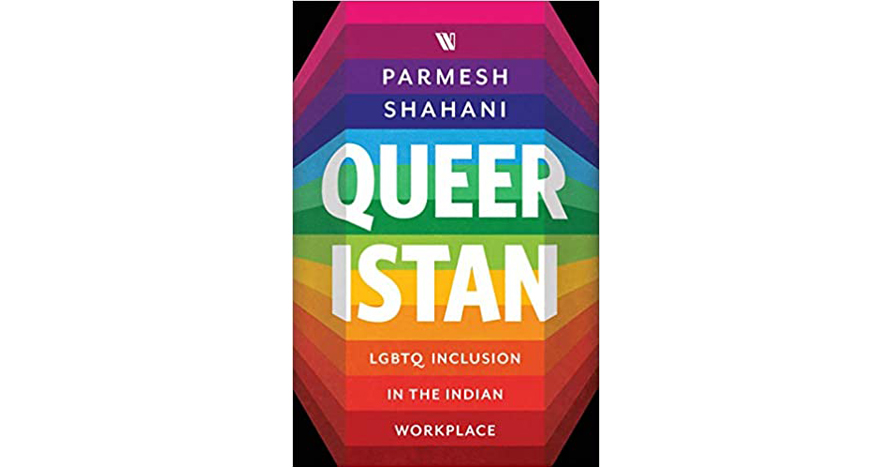Book: Queeristan
Author: Parmesh Shahani
Publisher: Westland
Pages: 320
Price: Rs. 699
Chintan Girish Modi
Parmesh Shahani’s new book, Queeristan: LGBTQ Inclusion in the Indian Workplace has all the ingredients of a Bollywood blockbuster. There is a strong emotional core with dramatic tension, foreign locations, background music and special appearances. A cross between memoir and manifesto, it is best described in the author’s own words: “How did a boy from Colaba who grew up in a 250- square-foot room and went to a 7- rupees-a. month SSC school — St. Joseph’s. Colaba— land up with a let-set business-class lifestyle that involves crossing from Mumbai to Boston to Vancouver in one effing week?”
This business book is not a yawn-inducing volume stuffed with facts and figures alone. It is written in a lively manner that make readers laugh and weep as they learn about the author’s journey as an out and proud gay man with a wide-ranging career as “entrepreneur, venture capitalist, fashionista, author, culture curator and LGBTQ change-maker. “He serves as vice president at Godrej Industries Ltd and heads the Godrej India Culture Lab, which is described as “a fluid experimental space that cross-pollinates ideas and people to explore what it means to be modern and Indian.”
The author’s personality is writ large on every page of this book, which makes it both honest as well as self-indulgent.
He is deeply familiar with the material he is writing about, and knows exactly how to lay it out so that the reader is kept informed, entertained and asking for more. He brings together perspectives from people who do not think alike, and cannot even stand each other. The push for LGBTQ inclusion in corporate culture is primarily made through arguments that appeal to family values, national pride, and basic human decency. With that broad framework held firmly in place, he skillfully weaves in lessons from activists, artists and academics.
Mr. Shahani writes, “Wearing one fabulous African-printed suit after another. I cruise from corporate boardrooms to college campuses to global conferences, waving my magic wand and sprinkling rainbow-coloured tinsel over all and sundry.”This book shows that the work of inclusion cannot occur without influencing a range of stakeholders. Since they are being asked to make major shifts in perspective and practice, they need some scaffolding and a roadmap. The author uses examples from his own life to educate and inspire.
He says,”When 1 first encountered a gay colleague in 2001while I was working at Sony Entertainment Television. I tried hard to pretend that I was straight, and when that failed, I swore him to secretary to not reveal ‘the secret’ to anyone else. “With self-acceptance came a large measure of confidence. A few years later, when Anand Mahindra offered him a job, he was able to ask if the Mahindra group had “a diversity policy that included LGBTQ as category,” and whether his partner living in the United States “would be offered spousal benefits” if he decided to relocate to India.
Studying at the Massachusetts Institute of Technology (MIT) had a huge role to play in Ms Shahani’s transformation. His writerly voice is filled with pride as he describes how liberating it was to live “openly as a gay person for the first time” in Boston. He started his master’s programme at MIT in 2003, and a year later Massachusetts became the first state in the US to legally recognise gay marriage. He and his partner could share it health insurance plan and have both their names on the apartment lease. “During the three years I was there, being gay became such a non-issue,” he remarks.
Moving back to India meant confronting a society that criminallised intimacy between same-sex partners and Institutionalised discrimination in families, workplaces and educational institutions. This book is the story of how Mr. Shahani carved his own niche within this environment, got involved with the queer rights movement in the country, and built strong ties across sectors to nurture his dream of creating LGBTQ-friendly workplaces. He provides concrete guidance on policy-making, recruitment, employee benefits, inclusive messaging, and relationship management.
The author’s optimism is balanced by a hard reality check. He is aware of the caste and class privileges he enjoys, and how those are not available to other LGBTQ individuals. He writes, ‘When I had broken up with my ex-Anand Mahindra had personally comforted me. My boss Ulhas and my colleague Shubha had been very supportive. May be I wasn’t discriminated against at Mahindra because I was close to the leaders? Would it have been different otherwise? Is it the same at Godrej now? Does my proximity to Nisa Godrej save me from possible harassment of this kind? I am afraid that the answer to all of these questions might be: yes.”
Courtesy: ‘Business Standard’





